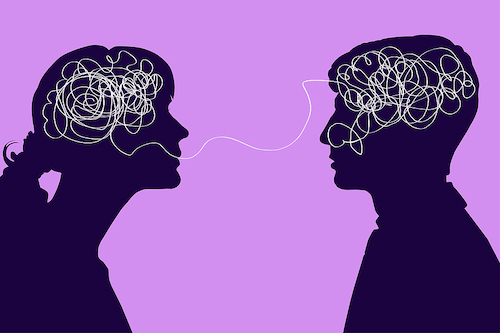August 27, 2021
by Elizabeth Pratt

As the COVID-19 pandemic spread across the world, an interesting phenomenon was playing out in grocery stores. Panic buying. As the COVID-19 pandemic spread across the world, an interesting phenomenon was playing out in grocery stores. Panic buying.
Consumers, in the face of increasing uncertainty, began stockpiling in a buying frenzy that left the shelves bare.
Now a study from the University of New South Wales in Sydney, Australia may have an explanation for the behaviour. Unexpected certainty can cause us to change our behavior even if it isn't helpful.
[More]
August 20, 2021
by Tina Arnoldi

Smartphones are a must-have for today's generation of young people. The desire to stay connected with friends and loved ones is understandable, but the obsession with constantly checking one's phone diminishes a student's attention span.
[More]
July 29, 2021
by Elizabeth Pratt

Evaluating the food choices made by their peers may improve the eating habits of young adolescents.
A study in the United Arab Emirates found that asking adolescents to consciously evaluate the food choices made by their peers caused them to choose healthier foods.
[More]
July 21, 2021
by Elizabeth Pratt

Strong family relationships gives teenagers greater empathy for their friends.
Research published in Child Development found that teenagers who had supportive and secure family relationships had greater empathy for their peers.
[More]
June 1, 2021
by Patricia Tomasi

Bipolar disorder is a mental illness that includes depressive and manic episodes. It affects about two per cent of people around the globe. The first line of treatment for bipolar disorder is a drug called lithium. Unfortunately, about 70 per cent of bipolar disorder patients don’t respond to it. A new study looked at whether genes had a role to play in lithium response in bipolar disorder patients.
[More]
May 30, 2021
by Elizabeth Pratt

You sit down in front of your computer screen and dial in to yet another video conference. The content of the meeting isn’t all that different from if you had gathered with your colleagues in person, but after back to back video calls, you’re exhausted. You’re not alone. Research published in the Journal of Applied Psychology found that more than 90 percent of employees reported feeling tired after a videoconference.
[More]
May 5, 2021
by Patricia Tomasi
.jpg)
A new study published in the Journal of Applied Neuropsychology: Child looked at computerized inhibitory control training and its effect on reducing anxiety in preadolescent students. “The key goal of the study was to further examine the interrelation between inhibitory control (IC) and anxiety in preadolescent-aged children, and to determine whether training IC through a remote, computerized program could serve as an effective means for reducing anxiety,” lead author, Nathaniel Shanok, Ph.D. told us.
[More]
March 19, 2021
by Elizabeth Pratt

Lab based studies of emotional and wellbeing may be missing real world anxiety.
A study from Duke published in PLOS One found that the background level of anxiety a person may normally experience could change how they behave in a lab setting. This could have important implications for research into wellbeing and emotional health.
[More]
February 25, 2021
by Elizabeth Pratt

Psychologists in the UK have developed the first ever mind reading questionnaire designed to assess how well people understand what others are truly thinking.
The researchers from the University of Bath, Cardiff and London developed the new questionnaire and in doing so determined that women are much better at understanding what others may be thinking.
[More]
February 23, 2021
by Patricia Tomasi

A new study published in the journal, PNAS (Proceedings of the National Academy of Sciences of the United States of America) looked at how childhood self-control forecasts the pace of midlife aging and preparedness for old age. “We studied whether as adults, children who exercise better self-control age more slowly, and are more prepared to manage the health, financial, and social demands of later life,” study author Leah Richmond-Rakerd told us. “We also investigated whether self-control in adulthood – not just childhood – is important for aging.” Prior studies have shown that people with better self-control live longer lives. Richmond-Rakerd and the team predicted that people with better self-control would also age more healthily, in midlife.
[More]